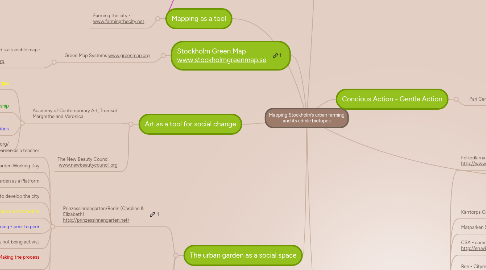
1. Stockholm Green Map www.stockholmgreenmap.se
1.1. Green Map Systems www.greenmap.org
1.1.1. Interactive user created sustainable map - Open Green Map - www.opengreenmap.org
1.1.1.1. Hard to reach people via the web
1.1.1.2. Find projects, people etc
1.1.1.3. Wiki-structure, becomes what the users make it into
2. Forest gardening
2.1. Suburban Farming
2.1.1. Maximum biodiversity
2.2. Christian/Tillväxt Free Food For All http://www.tillvaxt.org/
2.2.1. How do people know what to pick?
2.2.1.1. New node
2.2.2. Map the plants!
2.2.2.1. Maximum biodiversity
2.3. (Economical) Growth
2.4. Possabillities
2.4.1. Integrate into institutional education
2.4.2. Big popular interest
2.4.3. Big media spread
2.5. Challanges
2.5.1. Few active participants
2.5.2. Longterm engagement
2.5.3. To get people to start their own projects in their communities
2.6. Active citizenship
2.6.1. Approach people directly on site
2.6.2. People have to learn how to preserve fruits and vegetable at school
3. Mapping as a tool
3.1. Farming the city - www.farmingthecity.net
4. Art as a tool for social change
4.1. Academy of Contemporary Art, Tromsö/ Margrethe and Veronica
4.1.1. Challanges
4.1.1.1. Reach diverse locals
4.1.2. Active citizenship
4.1.2.1. Self-initiated education
4.1.2.2. Practicing selforganization
4.1.3. Possabillities
4.1.3.1. Art as a tool for social change
4.1.4. Marjetica Potrc http://www.potrc.org/
4.2. The New Beauty Council www.newbeautycouncil.org
5. The urban garden as a social space
5.1. Prinzessinnengarten/Berlin (Caroline & Elizabeth) http://prinzessinnengarten.net/
5.1.1. Garden as a teacher
5.1.1.1. Learning site
5.1.2. Garden Working Day
5.1.3. Garden as a Platform
5.1.4. Learning to develop the city
5.1.5. Relationships are not mobile
5.1.6. Experience-based learning - peer to peer
5.1.7. Currency is not being activist
5.1.7.1. Responsability of contiuning
5.1.7.1.1. Understanding complex structures
5.1.8. Posing questions openly! Making the process public!
5.1.8.1. We stay!
5.1.8.1.1. 3. Before leaving - Process of participatory city planning
5.1.9. Sell for set price - social value over 15 years
5.1.9.1. Ref. Ingvar Nielsen
5.1.9.1.1. Monetization of social value
5.2. Trädgård på Spåret/Stockholm (Max & Phillip)
5.2.1. Mobile Temporary Non-profit
5.2.1.1. Urban Garden
5.2.1.1.1. Social
5.2.1.2. Green Market
5.2.1.2.1. Economical
5.2.1.3. Ecological planting school
5.2.1.3.1. Educational
5.2.1.4. Cultural "Activity"
5.2.1.4.1. Cultural
5.3. How to deal with gentrification that might be accelerated though community gardens?
6. Challanges
6.1. Attract diverse participants (mostly white middle class engaged)
7. Community gardens in suburbs and CSA
7.1. Folkodlarna Skarpnäck - http://www.folkodlarna.se/
7.1.1. Olof
7.1.1.1. Challange
7.1.1.1.1. Longterm participation
7.1.1.2. Possabilities
7.1.1.2.1. Growing into several projects
7.1.1.2.2. Big media support
7.1.1.3. Active citizenship
7.1.1.3.1. Interacting with locals and bypassers
7.1.1.3.2. Melting pot and platform for different ideas and activities - also connected to Linje 17 http://forsjutton.se/
7.2. Kärrtorps Gerilla Community Garden
7.2.1. Mica
7.3. Matparken Skarpnäck
7.3.1. Folkodlarna med Sara Wallin
7.4. CSA - community supported agricultur http://en.wikipedia.org/wiki/Community-supported_agriculture
7.5. Ben - Citymine(d)
7.5.1. Possabilities
7.5.1.1. Create meeting place across class, race, gender, age, sexuality, disability etc
7.6. Siraj
7.6.1. Challanges
7.6.1.1. Participate seriously on the capitalist market
7.6.1.2. The Cuban Model - everyone can participate on their terms in a local produce exchange
7.6.1.3. How to be part of massculture?
7.6.1.4. Make a real percentual difference
7.6.1.5. Need deregulation on local level
7.6.1.6. Honesty on our level
7.6.2. Possabilities
7.6.2.1. Putting Economy into our projects
7.6.2.2. Farming the city - connector?
7.6.2.3. Honesty on our level
7.6.2.4. Daring to cross the street - "meet the other"
7.6.3. Active citizenship
7.6.3.1. Take part in the political sphere
7.6.3.2. Engage in municipal politics
7.6.3.3. Engage in national party politics
7.6.3.4. Civil disobidience
7.7. COLLECTIVE IMPACT!
8. Concious Action - Gentle Action
8.1. Pari Center for New Learning/Italy
8.1.1. Shantena
8.1.1.1. Shrinking villages
8.1.1.2. Conform to EU regulations
8.1.2. Cruz
8.1.2.1. Garden as a social and therapeutical space
